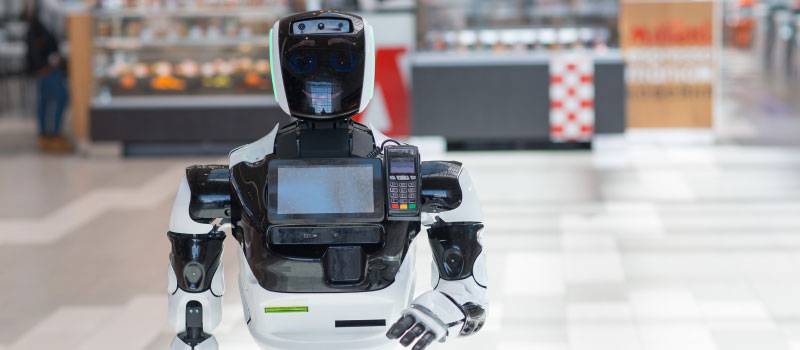
AI is empowering retail systems to collaborate to improve consumer interactions, forecasting, inventory management, and other functions. AI technology such as computer vision offers near-real-time intelligence to physical establishments. When evaluated in the cloud, the same data can yield additional business insights.
If you want an example of AI, evolving consumer experience look no further than your Spotify or Netflix suggestions. While browsing these suggestions, you’re certain to discover at least a few things that strike your curiosity. Suggestions like these are generated by computers based on what people listen to and watch online. Its suggestions are likely to be more relevant to your preferences than those of your own family and friends. Millions of individuals are already reaping the benefits of AI (artificial intelligence) in action.
If you’ve ever used Amazon’s product recommendations, you’re probably familiar with its machine learning-driven method. When AI-generated recommendations are both accurate and helpful, we as customers have grown to expect a certain level of “personalization” in the retail experience. A growing number of these machine-learning tools are available to smaller businesses, and some may simply be added as a plug-in to their current technology.
Artificial Intelligence has the potential to revolutionize retail customer service, but it is still in the early stages. Customers’ shopping habits will be drastically altered by machine learning in the next few years. Artificial intelligence (AI) is reshaping retail.
Let’s take a look at a few examples of how machine learning will have an immediate impact on the retail customer experience in order to better grasp AI’s application.
The ability to forecast customer attrition is one of the most potent AI applications in online retail. It is rare for a customer’s enthusiasm in purchasing from a shop to wane suddenly. There are a number of indicators to watch out for, including:
1. Time Reduction in Browsing
Customers with a high churn potential can be identified through the use of artificial intelligence (AI) solutions that track customer activities. It’s an opportunity for the business to take charge of its consumer interactions. Incentives don’t have to be confined to the most obvious choices, such as discounts and deals that are tailored to each customer. For example, the future generation of AI will have the ability to analyze these consumers’ buying history and uncover more subtle problems—slow shipment times or a scarcity of clothing in the right size—that may be contributing to their high churn potential. Automated techniques can then be used to resolve these issues on an individual basis.
2. Extraordinary Customization
A certain amount of customization is now expected by modern customers while shopping for goods and services online. In spite of today’s relatively modest machine learning algorithms, AI-driven tailored shopping recommendations can be surprisingly precise. A more advanced version of this technology will be able to generate more specific, targeted recommendations that are tailored to each particular customer’s tastes, interests, and budget.
For retail, the next generation of these personalization tools will also have practical applications. In the near future, a client could walk into a physical store and be directed to things of interest by an app on their smartphone. Customer purchase habits can be used to provide personalized discounts and coupons. In fact, these things can be purchased immediately, without the need for a checkout line. You don’t have to be a sci-fi fan to understand this. For years, Amazon has been experimenting with different iterations of this idea in their boutique stores.
3. AI-Powered Support
It can be easy to overlook the fact that most individuals are already dealing with an AI on a daily basis. Machine learning is used by large online merchants like Amazon to generate their personalized suggestions, as we’ve already covered. If you’ve ever asked Siri or Alexa a question, you’ve used AI. These AI virtual assistants are becoming a fully regular aspect of everyday life. It’s become so commonplace that many people aren’t aware that they are conversing with an AI in other contexts.
Let’s say you’re in charge of customer service. The sophistication of chatbots driven by artificial intelligence (AI) has already reached new heights. Customers can get answers to the most common questions they have by using these services. This lets the actual humans working in the customer care teams to focus on the more difficult assistance issues that are beyond the scope of the AI’s abilities. AIs will be able to handle more sophisticated client interactions as machine learning methods improve. Online merchants and other firms stand to gain greatly from this. It allows them to deliver truly comprehensive support to their consumers while keeping their personnel costs consistent.
4. Identify Outstanding Target Prospects
New AI technology provides e-commerce enterprises with the real-time intelligence they need to tackle business difficulties like lead creation. AI solutions for marketing, sales, and CRM systems are provided by predictive marketing companies such as Mintigo. Getty Photos has successfully produced large new leads using Mintigo’s software by capturing data indicating which firms have websites showcasing images from Getty’s competitors.
Conclusion
This is only the tip of the iceberg in terms of AI’s retail applications. By using these tools, businesses may improve client retention, tailor their marketing, and provide top-notch customer support without significantly increasing costs. In fact, AI-powered technologies may typically save expenses by automating a wide array of processes. AI offers numerous opportunities in retail to connect the gaps in the online and offline experience. The retailers get to build a digitally connected workspace for online and offline stores in one integrated system.
Are you a Start-Up or an SMB in the retail sector, and want to explore the massive potential of AI in your business and how it can improve your customers’ shopping experience? Reach our experts today!






